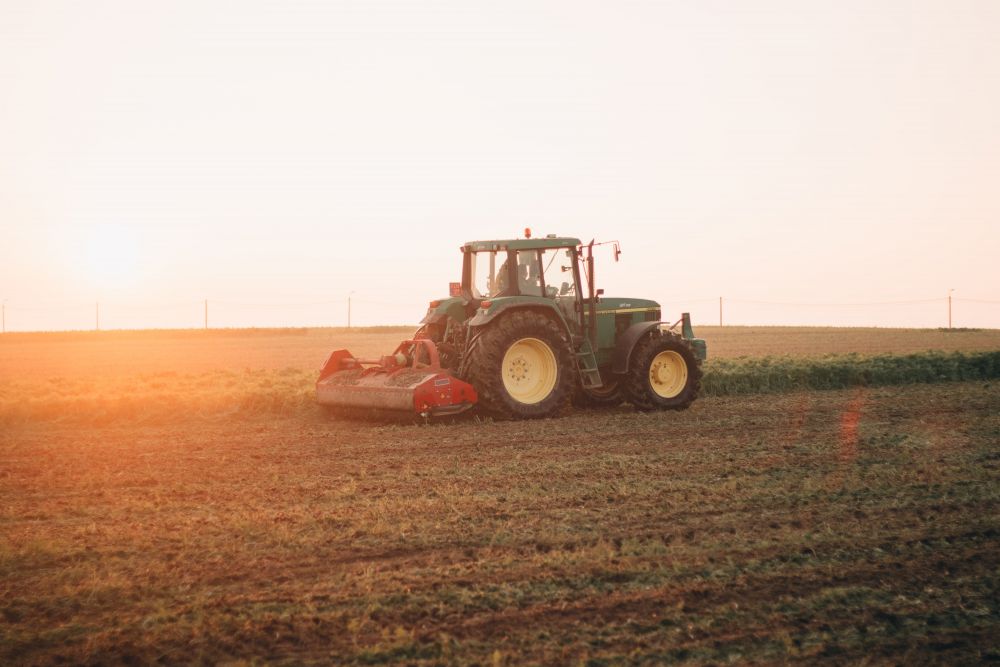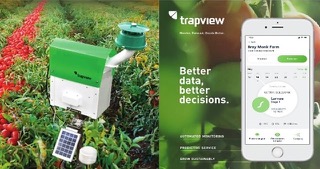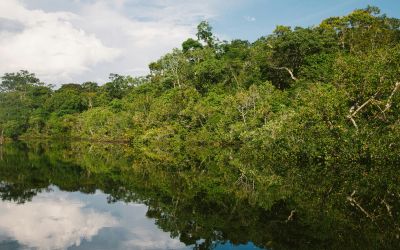10 Innovations in Agriculture
With less than 3 weeks to go, Climate Action is building momentum by showcasing innovations related to each of the 4 stages of content at the Sustainable Innovation Forum. This week exhibits our top 10 agriculture innovations!

This year marks the 12th annual Sustainable Innovation Forum. Taking place alongside COP26, SIF will unite heads of state and multilaterals, business leaders, investors, environment ministers and NGOs across both live and digital formats to accelerate ambitious climate targets and policies in order to mitigate the worst effects of climate change.
Register today to hear about the latest developments and event news leading up to one of the most crucial meeting of the century.
With less than 1 week to go, Climate Action is building momentum by showcasing innovations related to each of the 4 stages of content at the Sustainable Innovation Forum.
This week exhibits our top 10 agriculture innovations!
GreenWave
1. Bren Smith, owner of Thimble Island Ocean Farm and founder of non-profit GreenWave, is a pioneer in the development of regenerative ocean farming. His techniques use 3D ocean farming to create blue carbon – carbon that is captured by the world’s ocean and coastal ecosystems.

The GreenWave Model is a sustainable, polyculture commercial farming system that regenerates ocean ecosystems by creating carbon and nitrogen sinks, helping to reduce the impacts of ocean acidification. Smith’s model consists of vertical farms of scallops, mussels, oysters, clams and seaweed, used for animal feed, fertiliser and to help reduce bioplastics.
Recent studies at the University of California found that California’s agricultural emissions could be completely offset by growing seaweed in just 3.8% of federal waters off the state’s coast. In addition, the World Bank estimates that 10 million tonnes of nitrogen and 135 million tonnes of carbon could be sequestered if only 5% of the nation’s waters are farmed using seaweed.
As of 2019, Bren Smith accumulated a waiting list of over 4,000 farmers in 20 countries to develop his methods of ocean and coastal regenerative farming, with each farm costing between US$20,000 – 50,000. His sustainable farming successes will continue to expand globally as ocean restoration becomes more of a priority among farmers.
Symbrosia
2. It goes without saying that carbon dioxide has a significant impact on the climate. Methane, however, having around 84 times the global warming impact of CO2 over a 20-year period, and around 150 times the warming impact over a couple of years, represents itself as a fundamental driver of climate change.
The global livestock sector accounts for approximately 14.5% of all greenhouse gas emissions, of which 65% is emitted by cattle. This is where Symbrosia comes in.

Symbrosia is focusing on reducing the methane impact of cows by introducing seaweed into their diets. Scientific research, condu cted by Robert Kinley et.al, has found that replacing just 0.4% of a cow’s feed with Asparagopsis taxiformis – a type of red macroalgae – can reduce livestock methane emissions by over 90%, as well as increase growth rate.
The company is scaling the innovative solution to reduce livestock methane emissions using aquaculture techniques. By using sustainable farming techniques like aquaculture, it avoids the degradation of its ecosystems. However, implementing this organic solution worldwide still requires further trials in research and production. Nonetheless, Asparagopsis taxiformis could take humanity one step closer to a zero emissions future.
AeroFarms

3. Founded in 2004 and based in New Jersey, AeroFarms grows over 800 different crops using an indoor vertical farming system. By using 95% less water than traditional arable farming, the soon-to-be public company has managed to raise more than $238 million in disclosed funding, positioning themselves as a leader in the vertical farming space.
Unlike hydroponic farming – a technique that replaces soil with nutrient-rich water - AeroFarms uses aeroponic technology. This process involves using a cloth made from recycled plastic to mist the roots with water, oxygen and nutrients. Combined with efficient, LED lights designed to have a specific intensity and spectrum, the stable indoor conditions disrupt the cycle of indoor pests, eliminating the need for pesticides, fungicides and herbicides.
The sustainable indoor agriculture company could be a progressive solution to the agriculture industry, especially as climate change continues to affect the stability of weather patterns and therefore crop growth.
Trapview
4. Trapview is an automated pest monitoring and forecasting system that provides farmers with near real-time data about the conditions of their crops. By forecasting potential pest outbreaks, the AI technology serves as a digital employee to help protect the survival rates of crops.
Farmers who use Trapview experience lower production costs, higher yields, better risk management and operate under a much more sustainable ecosystem.

Founded in Slovenia in 2007, Trapview now manages over 4,000 fields and claims to possess the largest database of algorithms and pest data in the world. In an interview with AFN, CEO Matej Štefančič stated that the company’s algorithms have the potential to identify around 40 different species of insect in their forecasting models.
Trapview continues to receive investments from Japan’s Kubota, Italy’s Oltre Ventures and the Netherlands’ Pymwymic and are likely to assert themselves as a technologically disruptive leader in the sustainable farming industry in the years to come.
Kray Technologies

5. Kray Technologies have designed the world’s first fully digital and unmanned drone crop sprayer. Capable of autonomously spraying up to 1200 acres per day, the agricultural innovation hosts a variety of benefits for the average farmer.
The industrial drones serve as a replacement for ag planes, using less fuel, less maintenance and staffing, and operate at speeds of up to 70 mph, covering vast areas in little time. As a result, the highly efficient technology cuts applications costs by 90% to around $1 per acre.
Additionally, the growing ability to fertilise more frequently reduces yield losses. In fact, Kray has promised that their drones would increase yield output by 20-40% if adopted.
WorldCover
6. Agriculture is a highly volatile industry, vulnerable to extreme weather conditions continuously exacerbated by our changing climate. For those who farm in harsh climates or within impoverished communities, insurance is scarce - often leaving financially burdened farmers to the mercy of the climate. WorldCover, however, seeks to reduce this exposure and aims to speed up the process of claiming such notoriously laborious insurance.
Much of WorldCover’s target market already receives money via mobile payment services. This serves as the infrastructure for automated blockchain based insurance technology. Using this decentralised blockchain technology, they simplify the insurance payment process by developing smart contracts using distributed ledger technology. 
The adoption of smart contracts allows insurance payments to be automatically triggered once certain conditions have been met. Subsequently, fraudulent requests are prevented, and the speed and efficiency of payments is significantly improved.
It offers this kind of insurance by using high-resolution satellite imaging. Using this imagery, WorldCover analyses rainfall patterns to determine the level of compensation required. For example, a farmer with little education in remote India will understand that if his crops suffer from a lack of rain for a few weeks, he will be directly compensated with an automated payment on the blockchain system.
Currently, WorldCover only offers drought insurance. However, the company have announced plans to expand into crop diseases - an outcome directly correlated with extreme weather.
Joyn Bio
7. Founded in September 2017, Joyn Bio was established as a joint venture by Bayer – a pharmaceutical and life science company – and Ginkgo Bioworks – an analytics company that produces their own microorganisms – to engineer plant microbes in order to solve the various sustainability issues within the agriculture sector.
Aiming to engineer microbes that provide plants with biological nitrogen fertiliser, Joyn Bio subsequently reduces the amount of industrial nitrogen fertiliser; cutting greenhouse gas emissions by 3%, reducing water pollution and providing late-season nitrogen to crops.

Their developments in sustainable agricultural biologicals for crop fertility and resilience profiles the company as a leader in sustainable ag tech.
Edete
8. Without bees, humans simply cannot survive. The plants that rely so heavily on the pollination conducted by bees would no longer provide the necessary stability to our global food supply. In Europe, Asia and South America, bee populations are in decline. But no more drastically than in the USA, where 5.7 million honeybee colonies in the 1940s have dwindled to just 2.74 million as of 2015.
This is where Edete comes in. Established in 2016, the Israel-based company is engineering an ‘artificial pollination-as-a-Service’ solution to bee pollination. Led by mechanical engineer Eylam Ran, the company is developing a way to store pollen and then synchronise pollination using mechanical pollinisers.

Edete expects to start generating revenue by 2022 with the intention to take its service to market the following year. Its target market started off in the almond growing business, and has since expanded to fruits like apples, pears, plums and cherries. Other crops like cotton, canola seeds and pistachios are also some of Edete’s market interests.
BioFiltro

9. BioFiltro has come up with an unconventional wastewater treatment solution. Founded in Chile in 2009 and beginning operations in USA in 2013, BioFiltro exploits the digestive power of worms and microbes to remove around 99% of bacteria and other contaminants in wastewater. The treatment process allows for water to be reused for agricultural irrigation.
Thanks to their patented Biodynamic Aerobic System, BioFiltro states that they reduce greenhouse gas emissions by 91% - providing a highly sustainable nature-based solution to wastewater treatment within the agriculture sector.
Vence Corp

10. Livestock farms produce about 30% of the protein consumed worldwide. With a global population projected to reach roughly 10 billion people, global food production will have to increase by 70% by 2050. This indicates that the demand for animal protein is likely to increase, unless the adoption of veganism continues to exponentiate.
Vence is looking to make this rise in demand for animal protein more sustainable by using artificial intelligence to optimise grazing and maximise the yield of a farm through virtual fencing.
The innovative company designs dynamic boundaries that predict the grazing behaviour of livestock. The Vence app also enables customers to be equipped with a large database about the animals’ well-being and general health through lightweight sensors attached to their necks.
According to Vence, the virtual fencing technology helps provide up to 30% cost savings, detect health anomalies and reduce animal management costs. The novel farm management system has the potential to reduce labour costs by over 25% - eliminating the need for labour, ATVs and dogs.
In case you missed it, register here to be part of the historic climate movement.






